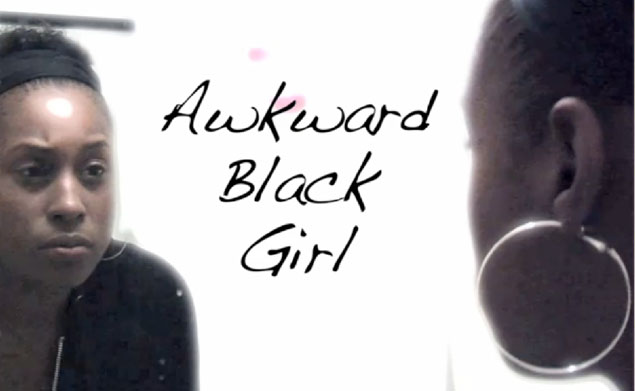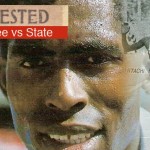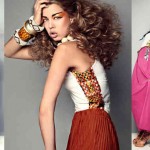
Web sensation Issa Rae is a woman on mission: the twenty-seven year old Senegalese-American wants to change the depiction of people of color. And it’s about time— it’s not often people of color are portrayed as diverse in Hollywood. Rae’s web series, The Misadventures of Awkward Black Girl, does just that; it’s a platform for well written characters in wacky situations. ABG’s rise in popularity is due to people of color being shown in a universal light. And people want more: Awkward Black Girl’s Kickstarter campaign successfully exceeded its $30,000 goal (it raised over $56,000). Muva, Issa took time out of her busy schedule to talk with Orijin Culture about her web series and the challenges in mainstream media.
Describe the premise of Awkward Black Girl.
The show is about an insecure girl, who goes through social situations and overanalyzes them. But they’re everyday situations—everybody has been through something in the show.
What prompted you to create ABG?
I had the idea two years ago, but I didn’t have the resources at the time. At the time I wanted it to be animated, so I sat on the idea and tried to find animators. I told one of my friends, who is an artist, about my idea. She thought it was really funny, but she couldn’t do it. Then a couple of months later, she sent me a link to an article asking where the black Liz Lemon is. I really identified with that character… it was similar to my idea, like Where are the awkward Black girls? Someone’s putting it out there and asking for it. I need to stop sitting on it, take action, and do it.
Why should people watch ABG?
Everybody should watch because it’s so relatable. Sure it’s called ABG, but you can relate to what she’s going through, been through, and thinking because we’ve all been there at some point. It takes life’s trivial moments and interactions, and amplifies them in comedic situations.
What’s the secret to ABG’s success?
Well, the fact it’s relatable and people have been through those moments helps. The word of mouth has been huge; it’s pretty much the success of the show so far. Also the fact that it’s different—it makes people excited and want to see other things that are different. People are tired of seeing limited characters on screen. They are demanding more diverse characters and I think that helps too.
Does casting yourself—a dark-skinned woman with a natural hairstyle— in the lead role impacts women and men?
Yes, it makes a huge impact. I got a letter from a father and it really touched me. It said, “Thank you for being natural on the show. It really helps my 13 year old daughter fight the perm monster.” I mean… here’s this Black father trying to teach his young daughter about natural beauty. There’s nothing necessarily wrong with perming your hair or pressing it. But there is something wrong with thinking that your own hair is disgusting and nappy or unkempt. That’s when it’s problematic. Do what you want with your hair, but don’t hate what you’ve been born with. If we have more characters that embrace and love their natural hair, it would definitely boost the confidence of a lot of young women.
One of the quotes from one of Awkward Black Girl’s episodes was “Television has a very limited scope and range in it’s depiction of people of color. We want to change that.” From your perspective, why does television have limited options for people of color?
That’s a great question. Because Black people are still grouped together. America has a black president, but we’re still not varied in our depictions of people. There’s no acknowledgement that we are different people. Even on the special reports it’s like, What’s going on with Black women as a whole? There’s no separation and we’re not all the same. We share a culture, but we’re not the same people. That’s not understood, especially in mainstream Hollywood or in television in general. Hollywood people think that they know what we like and what we want to see—and that’s a limited a group of people. Once Hollywood figures out we’re not the same group, the same woman, or the same man… then we’ll start to see more diverse depictions. Until then, we’re going to see the same characters.
So we see limited images of ourselves on TV and film. How much do we limit ourselves as people of color?
We play a role—and it’s a vicious cycle. If we see what we’re supposed to be… then we’re going to call other people out on not being what we’re supposed to be. So if this image is constantly projected of us, we believe it. If someone challenges that image—and we’re so used to it—we’re gonna call people out.
If TV is limited in scope and range, how is ABG helping to change the TV landscape?
I think it’s helping to change it just by offering different views of minorities. Sujata Day (who plays CeCe) mentions that she gets typecast a lot. With her being Indian, we’re changing that. We don’t necessarily acknowledge race all the time, and do poke fun at stereotypes. We’re changing the landscape that way.
In a recent Clutch interview, it was asked how you deal with adversity in a predominately white male industry. You said you thrived on being ‘the other’ because it helps you to stand out. How does being ‘the other’ drive your storytelling?
I think being ‘the other’ helps me tell stories because they’re not told. If someone wants to keep on telling the same story, fine—bore people. But I’m telling a different story and calling attention away from that. So being ‘the other’ helps. Maybe BET wants to keep putting out the same thing… fine—limit yourself. But I rather do the other because at least I’ll be telling somebody’s story. Or speaking on behalf of somebody’s voice, and that’s worth it to me. I don’t need to be like everybody else in that sense, because it’s boring.
By Yolanda Riley

Izikhala zakamuva by cadmin (bheka konke)
- The Story of a Ghetto Boy - June 28, 2015
- The Rise of The Next Gen. Marley’s | Bob Marley’s grandsons (VIDEO) - Kwangathi 8, 2015
- Ngaleso sikhathi endaweni ethile eSweden, laba badansi base-Afrika baseSweden… - March 24, 2015



